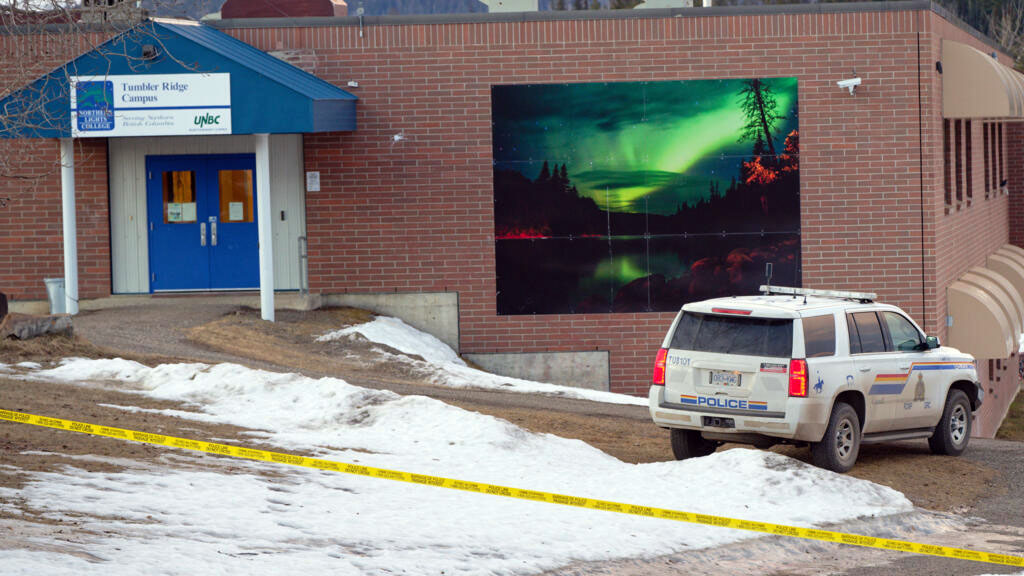International
Russia escalates false chemical weapons claims about US, Ukraine

Russia is doubling down on its false claims that the U.S. and Ukraine are developing chemical or biological weapons for use against invading Russian forces, bringing the accusation to the United Nations Security Council on Friday.
A web of disinformation, not only from Russian state media but also Chinese propaganda outlets and even some American voices, have increasingly spread the conspiracy theory this week.
That’s prompted heightened concern among U.S. and Ukrainian officials that Russia itself may be planning to deploy chemical or biological weapons against Ukrainian targets or as part of a so-called “false flag” operation.
“This makes me really worried because we’ve been repeatedly convinced if you want to know Russia’s plans, look at what Russia accuses others of,” Ukrainian President Volodymyr Zelenskyy said in a televised address late Thursday, a sentiment the White House first shared Wednesday.
Ukraine does not have biochemical weapons laboratories. Instead, there are public health and veterinary health labs operated with U.S. support in Ukraine and several other former Soviet countries that provide technical support to a government’s health ministry and study disease, like the U.S. Centers for Disease Control and Prevention.
READ ALSO:
- Russia strikes western Ukraine targets, renews push toward Kyiv
- Osinbajo, Atiku others grace installation of 42nd Olubadan
- (ICYMI) Lagos-Ibadan train runs out of diesel, stops midway, passengers complain + VIDEO
U.S. support originated with the Cooperative Threat Reduction program, launched in 1991 to help secure and dismantle the remnants of the former Soviet Union’s biochemical weapons program in newly independent states, including Ukraine.
The U.S. has talked openly about the program throughout its history, working with 26 facilities in Ukraine on issues like biosafety and scientific mentorship training, according to the Bulletin of Atomic Scientists, an independent nonprofit dedicated to science and global security.
But in recent years, Russia, as well as China, has escalated accusations that these labs constitute a secret U.S. biochemical weapons program, at one point even claiming in state-run media outlets that they created the COVID-19 pandemic. In bitter irony, these labs have helped detect and stop the spread of COVID-19, according to public health officials.
Those false claims have skyrocketed this week, with Russian now bringing them to one of the world’s brightest spotlights — the U.N. Security Council. Russia’s mission in New York called for an emergency meeting Friday, 24 hours after its defense ministry falsely claimed it uncovered “U.S. secret military biological projects in Ukraine,” per state-run media.
“We’re not going to let Russia get away with gaslighting the world or using the U.N. Security Council as a venue for promoting their disinformation,” Olivia Dalton, the spokesperson for the U.S. mission to the U.N., told ABC News Thursday.
It’s unclear if the U.S. will try to stop the meeting, currently scheduled for 10 a.m. ET. Procedural matters, like holding a meeting, require nine of the chamber’s 15 envoys to vote in favor, and no country can veto a meeting being held.
While the false claims have escalated this week, Russian Defense Minister Sergei Shoigu ranted back in December that Ukraine, with U.S. mercenary help, was preparing a chemical weapons attack.
In 2018, Russia also made similar accusations against Georgia, the small former Soviet state that the Kremlin invaded a decade earlier as its government, like Ukraine’s, sought NATO membership. Russian forces still occupy two regions of the country, recognizing them as independent states — just as it did last month in eastern Ukraine before launching its invasion.
“The Russian allegations appear to be part of a disinformation campaign that has grown in response to scrutiny of Moscow for using and enabling the use of chemical weapons,” the Bulletin of Atomic Scientists reported in 2018 when Russia’s claims about Georgia were proven false.
The Kremlin record of “using and enabling the use of chemical weapons” runs deep, according to the Bulletin of Atomic Scientists, especially against individuals deemed enemies.
READ ALSO:
- NDLEA intercepts 3m opioid caps, 8,613kg of Loud at Lagos terminal, Eko beach
- [Breaking] Bamise murder: Court remands BRT driver for 30 days
- Arrested Lagos BRT driver raped me inside bus, says victim, presents evidence
No one is higher on that list right now than Alexey Navalny. The opposition leader and anti-corruption activist was poisoned in August 2020 with the nerve agent Novichok by agents from the FSB, Russia’s principal security agency. He was flown to Germany and recovered before returning in January 2021 to Moscow, where he was almost immediately arrested.
Another notable example before Navalny were the Skripals. Sergei Skripal, a former Russian officer who was a double agent for the United Kingdom, was also poisoned with Novichok in March 2018 in Salisbury, England. His daughter Yulia and a police officer were also hospitalized by the attack, but all three recovered.
In contrast, Ukraine has been in full compliance with the chemical and biological weapons conventions since signing them in 1972 and 1993, respectively, according to the State Department.
Asked about Ukraine’s biomedical facilities, CIA Director Bill Burns told the Senate Thursday, “In any public health system around the world, there’s going to be work done in the interests of wider public health, to ensure that we have a grip on issues like that. But that’s in no way threatening. That’s not something that can be weaponized in the way that the Russians have clearly demonstrated — by their own actions against their citizens and people outside their country — their willingness to use.”
It’s unclear whether U.S. intelligence has any evidence that Russian forces are preparing for a chemical or biological attack. The White House, State Department and Pentagon publicly pointed only to “Moscow’s track record” and “increasingly concerning rhetoric,” in the words of State Department spokesperson Ned Price.
But a senior Pentagon official told reporters, “We have picked up indications that the Russians could be making these claims — these false claims — about us and Ukrainian work in bio defense as a way of creating a pretext of their own, to perhaps use these kinds of agents in an attack.”
Pressed on what “indications” they were referring to, they added, “I have to leave it with you with indications, and [I’m] not going to be at liberty to go in more detail than that today.”
For those in Ukraine, where Russian forces have shown there’s little they won’t do to subjugate the country, the fear is real.
“The manic obsession with which various Russian officials fantasize about non-existent biological or chemical weapons or hazards in Ukraine is deeply troubling and may actually point at Russia preparing another horrific false flag operation. This tweet is for the record,” Ukrainian Foreign Ministry Dmytro Kuleba tweeted Thursday.
ABC News’ Luis Martinez contributed to this report from the Pentagon.
International
Russia Escalates Digital Control with Attempted WhatsApp Block

Russia Escalates Digital Control with Attempted WhatsApp Block
WhatsApp has accused the Russian government of trying to completely block its messaging service in the country, a move aimed at steering users toward the state-backed app MAX. The Meta-owned platform said the effort, reported on February 12, 2026, threatens over 100 million users and undermines private, encrypted communication in Russia.
In a statement, WhatsApp said: “Today the Russian government attempted to fully block WhatsApp in an effort to drive people to a state-owned surveillance app. Trying to isolate over 100 million users from private and secure communication … can only lead to less safety for people in Russia. We continue to do everything we can to keep users connected.”
READ ALSO:
- Tumbler Ridge Massacre: Canada Investigates Shooter’s Mental Health, Police History
- Ex-Acting AGF Nwabuoku Admits Diverting N868.4 Million to Private Firms
- Kwankwasiyya Urges US Congress to Drop Kwankwaso’s Name from Bill
The attempt is part of a broader crackdown on foreign tech platforms in Russia. Authorities have previously restricted access to Facebook, Instagram, and targeted other services like Telegram. Reports indicate that Roskomnadzor, Russia’s communications regulator, removed WhatsApp from its national internet directory, forcing users to rely on VPNs to access the platform. Critics warn that such measures are designed to expand state surveillance and control over digital communication.
The government is actively promoting MAX, a domestic “super-app” similar to China’s WeChat, which combines messaging with other services. Rights advocates caution that the push toward MAX could compromise privacy protections that platforms like WhatsApp provide. Meanwhile, Kremlin officials have indicated that WhatsApp and other restricted apps could be restored if Meta complies with local data storage and regulatory laws.
WhatsApp’s statement emphasizes that the company will continue to work to keep its service accessible where possible, but the attempted block highlights Russia’s ongoing effort to enforce digital sovereignty and shift users toward state-controlled technology platforms.
Russia Escalates Digital Control with Attempted WhatsApp Block
International
Tumbler Ridge Massacre: Canada Investigates Shooter’s Mental Health, Police History

Tumbler Ridge Massacre: Canada Investigates Shooter’s Mental Health, Police History
Canadian authorities are intensifying investigations into the mental health history and prior police interactions of Jesse Van Rootselaar, the 18-year-old who carried out a deadly mass shooting in the remote mining town of Tumbler Ridge, British Columbia, on February 10, 2026. The tragedy has left the small community in mourning and raised national questions about gun control, mental health support, and law enforcement interventions.
According to RCMP Deputy Commissioner Dwayne McDonald, authorities are still unclear on the motive behind the attack, which is one of the deadliest school shootings in Canadian history. Van Rootselaar, a transgender woman who had dropped out of Tumbler Ridge Secondary School four years ago, first killed her mother and stepbrother before opening fire at the school, where she shot six more victims. The shooter later took her own life at the scene.
Investigators have confirmed that Van Rootselaar was known to police and had previous interactions with the public health system due to mental health concerns. Authorities are reviewing prior incidents, including earlier firearms seizures and her lapsed gun licence, to understand how warning signs were addressed before the massacre. British Columbia Premier David Eby said officials are working with the health system to determine “what interactions may have taken place” in the past.
READ ALSO:
- Ex-Acting AGF Nwabuoku Admits Diverting N868.4 Million to Private Firms
- Kwankwasiyya Urges US Congress to Drop Kwankwaso’s Name from Bill
- Liverpool Edge Sunderland 1-0 to Halt Impressive Home Streak
The victims include a 39-year-old female teacher and five students aged 12 and 13, with one child, 12-year-old Maya Gebala, in critical condition after trying to lock herself and classmates in a library during the attack. First responders arrived within minutes, but the scale of the violence left the tight-knit community of about 2,700 residents reeling. Hundreds gathered for a candlelight vigil to honour those killed and injured.
Prime Minister Mark Carney addressed parliament, describing Tumbler Ridge as a resilient, compassionate community of miners, teachers, and construction workers, and emphasised the need to learn from the tragedy. Flags across Canada have been lowered to half-staff for seven days in remembrance of the victims. Britain’s King Charles and Queen Camilla also expressed shock and sorrow over the massacre.
Schools in the area will remain closed for the remainder of the week as authorities continue their investigation into Van Rootselaar’s mental health background, police interactions, and access to firearms, seeking to understand how similar tragedies can be prevented in the future.
Tumbler Ridge Massacre: Canada Investigates Shooter’s Mental Health, Police History
International
Canada Mass Shooting: Nine Dead in School, Residence Attack

Canada Mass Shooting: Nine Dead in School, Residence Attack
A mass shooting in Tumbler Ridge, British Columbia, Canada has left nine people dead and dozens injured after an attacker opened fire at a secondary school and a nearby residence on Tuesday, February 10, 2026.
According to the Royal Canadian Mounted Police (RCMP), seven victims were killed at Tumbler Ridge Secondary School, while two others died at a residence connected to the incident. At least 27 people were wounded, including two in critical condition, while the rest sustained non-life-threatening injuries.
The suspect was found deceased at the scene from an apparent self-inflicted injury. Authorities have not yet released the identity or motive behind the attack, which has shaken the small community of roughly 2,400 residents.
READ ALSO:
- Police Arrest Suspect as Youth Suffers Head Injury in Vigilante Custody
- Boko Haram Seizes Four Trailers, Rustles Over 100 Cows in Borno
- Wike Backs Tinubu’s Peace Efforts, Vows Stability in Rivers
Police responded rapidly, issuing an active shooter alert, placing schools on lockdown, and evacuating students safely. The RCMP and local officials continue to investigate the circumstances surrounding the attack and the suspect’s background.
Local leaders described the event as a devastating tragedy, expressing solidarity with victims’ families. The shooting has prompted national attention in Canada and renewed calls for enhanced school security and measures to prevent mass shootings.
Authorities have urged the public to remain vigilant and report any suspicious activity, emphasizing the importance of community cooperation in maintaining safety and preventing similar tragedies.
The attack is considered one of the deadliest school-related shootings in Canada in recent years, drawing widespread condemnation and grief across the country.
Canada Mass Shooting: Nine Dead in School, Residence Attack
-

 metro2 days ago
metro2 days agoLeadership Crisis at NAHCON as Chairman Abdullahi Saleh Usman Resigns
-

 News2 days ago
News2 days agoOyo Muslims Reaffirm Loyalty to Sultan on Islamic Matters — Grand Chief Imam
-

 News2 days ago
News2 days agoUS Judge Orders FBI, DEA to Release Tinubu’s Criminal Records, Faults Delays
-

 International2 days ago
International2 days agoUS to Deport 18 More Nigerians on ‘Worst-of-the-Worst’ Criminal List (Full Names)
-

 metro2 days ago
metro2 days agoFormer NAHCON Chief Explains Why He Stepped Down, Denies Conflicts
-

 Business2 days ago
Business2 days agoNaira Posts Strong Comeback, Breaking Two‑Year High Against Dollar
-

 Business3 days ago
Business3 days agoCAC Deploys AI, Partners Google to Tackle Rising Business Registration Demand
-

 metro3 days ago
metro3 days agoCourt of Appeal Affirms Senate’s Power to Suspend Natasha Akpoti













